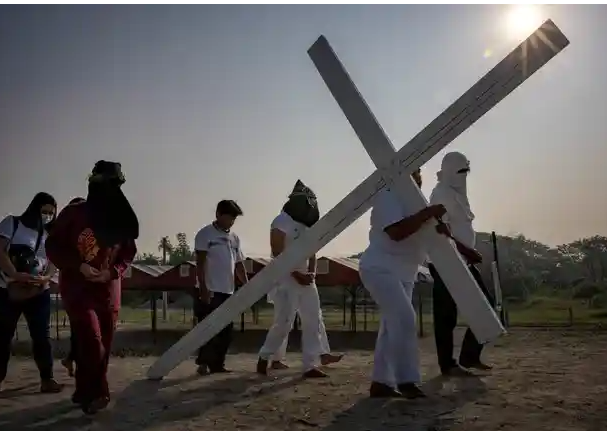
What is the meaning of Good Friday?
Why is it called Good Friday?
What to know about the holiday
Easter is right around the corner, but before people around the world celebrate the holiday, those who observe it religiously will commemorate the season with Good Friday.
The week leading up to Easter is known as Holy Week, which begins after the end of the 40-day Lenten season. Good Friday takes place during this week annually two days before Easter.
While Christians celebrate the resurrection of Jesus Christ on Easter, Good Friday serves an important part in the story of Christ essentially to Easter celebrations.
“Good Friday is part of something else,” Gabriel Radle, assistant professor of theology at the University of Notre Dame, told USA TODAY. “It’s its own thing, but it’s also part of something bigger.”
Here’s what to know about the meaning and practices of Good Friday:
What is the meaning of Good Friday?
Good Friday is the day in which Christian and Catholic churches commemorate the crucifixion and death of Jesus Christ.
“If Easter is the celebration of Christ’s resurrection from the tomb, Good Friday is the day in which the church commemorates everything from his condemnation to his passion,” Radle said.
Why is it called Good Friday?
Good and death don’t really go together, but Radle explains the “good” in the death of Jesus Christ is in Christian ideology, his death represents the redemption of humanity, as the celebrations of Easter wouldn’t be possible without what happened on Good Friday.
“Christ is offering himself on the cross. It’s an outpouring of God’s love by offering himself on the cross, but it’s also not something that ends at the cross,” he said.
“It’s not just the commemoration of Christ’s passion for the sake of focusing on the agony of it all, but the agony has a purpose. That’s God’s gift of redemption to the world, which finds fulfillment in in the resurrection.”
The holiday has different names around the world, such as “Great Friday,” “Holy Friday,” “Sorrowful Friday” in Germany or “Sacred Friday.”
How do you commemorate Good Friday?
Radle said “there’s all sorts of practices” done on Good Friday throughout the world for worshipers to contemplate and commemorate the death of Christ. It should be viewed as an act done by humanity, requiring repentance – worshipers should confess their sins and profess their devotion to God.
Unlike most religious holidays, Mass isn’t usually held on Good Friday; instead readings of the Gospel, veneration of the cross and Holy Communion are done.
“There’s almost a liturgical fast and so far as the things that are taken for granted, like the celebration of the Eucharist,” Radle said. “Annual things like Good Friday tend to conserve a lot of unique traditions that go back really far in history.
Also practiced: the Stations of the Cross, in which worshippers pray and reflect along 14 “stations” or images depicting Christ’s journey from his condemnation through his crucifixion and eventual death. In some parts of the world, worshipers will also perform passion plays in which they recreate the events, similar to what’s done during Christmas Mass with the birth of Christ.
Can you eat meat on Good Friday?
While there’s some disagreement about when the Lenten season ends – 40 days after Ash Wednesday (April 6), on Good Friday or Easter – Catholics are not supposed to eat meat on Good Friday, just as on the other Fridays during the Lent.
“Since Jesus sacrificed his flesh for us on Good Friday, we refrain from eating flesh meat in his honor on Fridays,” the Archdiocese of Saint Paul and Minneapolis said.
Also on Good Friday, worshipers – with the exception of children and the elderly – are supposed to fast by allowing themselves to have one meal that day.










